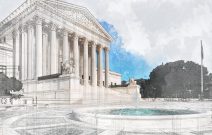The federal judiciary has become dominated by what Glenn Harlan Reynolds calls Front-Row Kids—a credentialed elite with a prescribed resume.
Windsor Whiplash: Consistency and the Court
One of the defects of public discussion of the Supreme Court is that journalists who are so enamored of process stories in electoral contexts cut straight to the bottom line—who won, who lost—and skip the constitutional reasoning where the judiciary is concerned. That was how one of the biggest jurisprudential stories of last week—the extraordinary whiplash judges and partisans on both sides displayed between Tuesday’s ruling on the Voting Rights Act and Wednesday’s on DOMA—got overlooked. Call it a tale of two laws, each passed by overwhelming legislative majorities, one gutted by the Court’s conservatives, the other overturned by the Court’s liberals (the evanescent Justice Kennedy counts as both), each of whom accused the other of activism and called for restraint—all within 24 hours, and passing virtually without remark. Those who hope for a consistent ethic of judicial restraint—which is to say those who haven’t been paying attention—will have to wait for another term.
The tale began on June 25, when the Court announced its opinion in Shelby County v. Holder, holding section 4(b) of the Voting Rights Act—passed 98-0 in the Senate, including the votes of senators from the aggrieved southern states, and 390-33 in the House—unconstitutional. The Court’s conservatives held that Congress could not single out certain states for current treatment based on past practices without contemporary justification, which it deemed to be wanting. Yet the majority’s opinion—compelling as it may be—reads like a Senate floor speech, a fine argument for why the law needs updating. It does not answer why that is a job for the judiciary.
Instead, the majority invokes federalism as a core constitutional principle, mentioning only briefly the decisive fact that the Constitution’s 15th Amendment explicitly empowers Congress to enforce voting rights by “appropriate legislation.” The Court thus all but arrogates to itself the patently legislative function of deciding what laws are “appropriate.”
Justice Ginsburg, in dissent, was having none of that. She appealed to the doctrine of judicial deference, repeatedly quoting and in some detail analyzing the enforcement clause of the 15th Amendment: “The question this case presents is who decides whether, as currently operative, [the law] remains justifiable, this Court, or a Congress charged with the obligation to enforce the post-Civil War Amendments ‘by appropriate legislation.’” Similarly, Congress’ determination that the Voting Rights Act was still necessary “merits this Court’s utmost respect.”
That was Tuesday. On Wednesday, Ginsburg voted with the majority—this time rendered liberal by Kennedy’s defection or, depending on one’s perspective, return home—to overturn another law of Congress. This one, the Defense of Marriage Act, had passed the Senate 85-14. The case was U.S. v. Windsor, and for Ginsburg at least, restraint had been Tuesday’s argument. Now it was taken up with characteristic rhetorical force by Justice Scalia, who the day before had voted opposite Ginsburg to strike down section 4(b) of the Voting Rights Act. His argument—that is, on Wednesday, for those keeping track, or attempting to, at home: The will of the people as expressed through Congress deserved deference. What was that about passing 98-0 in the Senate?
That, to be fair, did not form the whole of his dissent, much of which was consumed by his sadly overlooked standing argument, which noted that in U.S. v. Windsor, the United States was in fact not contesting the position of Mrs. Windsor. But having lost that argument, he proceeded to the merits of the case. His language scorched: “The Court’s errors [on both standing and the merits] spring forth from the same diseased root: an exalted conception of the role of this institution in America.” He continued: “Few public controversies will ever demonstrate so vividly the beauty of what our Framers gave us, a gift the Court pawns today to buy its stolen moment in the spotlight: a system of government that permits us to rule ourselves.”
But there might have been one that, if less vivid, was still apt: namely, the case the Court decided the day before and in which Scalia voted on the contrary side. Similarly, Ginsburg, signing on to Kennedy’s lyrical opinion about “dignity” on Wednesday seemed to have forgotten her Tuesday belief that Congress got to decide the meaning of such fungible terms as “appropriate.”
Some commentators on the right have been consistent in their calls for deference—Ramesh Ponnuru has been one, Ross Douthat another—while others, such as George Will, have offered principled grounds for overturning the Voting Rights Act without applying a double standard to Windsor. But the Court itself is suffering from creeping consequentialism. Judicial restraint, like constitutionalism itself, demands a willingness to accept decisions one does not like—because democracy, like sharing a sandbox with others, does too.
The Voting Rights Act—set aside questions of its wisdom or unwisdom; the issue here is its constitutionality—offered an especially compelling opportunity for the conservative wing of the Court to demonstrate a consistent commitment to restraint, based as it was on a clear constitutional warrant for Congressional action. Liberal jurists’ appeals to restraint appear equally opportunistic. Restraint, to be fair, is a difficult ethic to define. But those who invoke it ought to be able to do so with reasonable consistency. If one issue to the next is too tall an order, one day to the next ought not to be.

